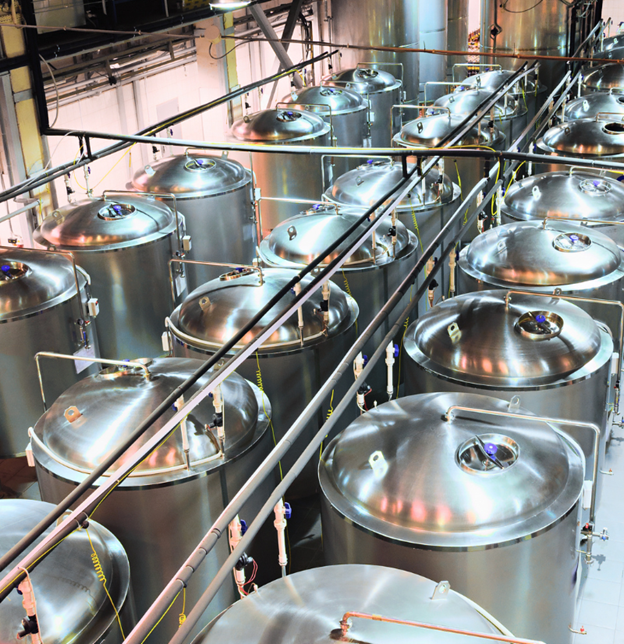Understanding Aerobic Fermentation
Aerobic fermentation is a metabolic process where cells metabolize sugars using oxygen. Unlike anaerobic fermentation, which doesn’t require oxygen, aerobic fermentation thrives when oxygen is abundant, especially in the initial stages of fermentation. What makes aerobic fermentation unique is its shorter duration and increased intensity, making it an interesting topic for bioprocessing experts and enthusiasts to study.
In the field of bioprocessing, where organic materials are transformed into valuable ethanol and chemicals, aerobic fermentation processing takes a prominent position. In the world of aerobic fermentation, its significance across various industries and the hidden complexities beneath its surface are key aspects to explore.
Key Industries
Aerobic fermentation isn’t confined to the laboratory. Its influence is found across many industries. Listed below are just some of the many industries that depend on aerobic fermentation:
- Biofuels: Aerobic fermentation plays a crucial role in converting organic materials like corn or sugarcane into ethanol.
- Biotechnology: Aerobic fermentation is widely used to produce many bio-based products, like pharmaceuticals, enzymes, and organic acids.
- Biomaterials: Aerobic fermentation is instrumental in the production of many biodegradable plastics and bio-based polymers.
- Food and Beverage: Aerobic fermentation is used for processes like brewing, where yeast undergoes aerobic fermentation to produce beer, and in the production of organic acids, flavor compounds, and other food additives.
- Chemical: Aerobic fermentation is used to produce valuable chemicals like citric acid, lactic acid, and other organic compounds.
- Pharmaceuticals: Aerobic fermentation is used to produce antibiotics, vaccines, and other biopharmaceutical products.
- Wastewater Treatment: Aerobic fermentation is used in treatment facilities to break down organic matter and reduce pollutants.
- Agriculture: Aerobic fermentation is used for the production of bio-fertilizers and bio-pesticides, promoting sustainable farming practices.
All these industries benefit from aerobic fermentation due to its efficiency in converting organic substrates into valuable products, while harnessing the power of oxygen in the process.
Navigating the Complexities of Fermentation
Fermentation, whether aerobic or anaerobic, is a multifaceted and intricate process involving carefully orchestrated steps. Let’s look at these essential process steps and the equipment that plays a pivotal role in each phase:
- Media Preparation: The journey begins with media preparation, where the selected microorganisms are provided with a nutrient-rich environment to thrive. In this phase, blending tanks to mix and homogenize the ingredients, agitators to maintain the suspension of microorganisms and nutrients, and heat exchangers to control the temperature for ideal growth conditions, are all used.
- Inoculation: The inoculation step is crucial, as it is where the microorganisms (yeast, bacteria, etc.) are introduced into the prepared media. This is where the fermentation process kicks in, and careful control of microorganisms is essential.
- Fermentation: The heart of the process is the fermentation phase, where microorganisms metabolize the nutrients in the media and produce a desired product – ethanol, organic acid, or enzymes. Proper monitoring and control of temperature, pH, and oxygen levels are vital here.
- Harvesting: The desired product must be harvested once the fermentation is complete. Various techniques, including centrifugation and filtration, are used to separate the product from the broth, ensuring the extraction of the valuable product in its pure form.
- Purification: The harvested product often needs further purification to meet quality standards. At this stage, chromatography, distillation, or other purification methods are typically used to remove impurities and contaminants, resulting in a high-purity final product.
- Downstream Processing: Once the products are purified, downstream processing steps are necessary to prepare the product for the market. These steps can include concentration, formulation, and final product packaging, ensuring the product is ready for distribution.
Each of these fermentation phases requires specific equipment, expertise, and precise control to achieve the desired outcomes. Successful fermentation is more than just understanding science. It is also about efficiently utilizing the right equipment and techniques to optimize the process. A thorough understanding of these complexities is essential for a successful outcome.
Embracing Aerobic Fermentation’s Potential
As bioprocessing continues to evolve, aerobic fermentation processing remains its cornerstone, driving innovation and efficiency in the production of valuable biofuels, chemicals, and more. Its applications continue to captivate researchers and industry professionals. As the diverse realms of bioprocessing continue to be explored, we continue to unlock the full potential of aerobic fermentation and pave the way for a sustainable and greener future.
About Lee Enterprises Consulting
Lee Enterprises Consulting has over 180 experts that can help navigate your bioeconomy needs. If you need assistance with your aerobic fermentation project(s), please Contact Us.
